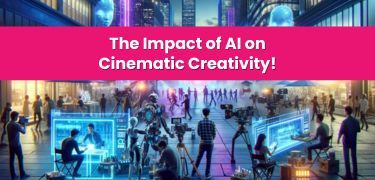Discover the Latest in Animation & VFX at Seamedu
Artificial Intelligence (AI) has become an integral part of our lives, revolutionising various industries, including the world of film making.


Introduction:
Artificial Intelligence (AI) has become an integral part of our lives, revolutionising various industries, including the world of film making. From assisting in visual effects to predicting box office successes, AI has made its mark. However, as AI continues to advance, concerns have arisen about its potential impact on the creative aspect of filmmaking. In this blog, we will explore how AI is shaping the landscape of cinema, AI in films, and discuss both the positive contributions and the challenges it poses to artistic creativity.
The Positive Side: Enhancing Visual Effects and Efficiency with AI in Cinema and Films
AI has significantly transformed the visual effects (VFX) industry, enabling filmmakers to create stunning and realistic scenes that were once thought impossible. For instance, in movies like "Avengers: Endgame" and "The Lion King" (2019), AI-driven tools were used to animate complex characters and bring them to life on the big screen. These advancements save time and resources, allowing filmmakers to focus on other creative aspects.
Additionally, AI algorithms are employed to analyse audience preferences, predict box office performances, and even optimise marketing strategies. Movies like "Gone Girl" (2014) benefited from AI-driven audience analysis, leading to more effective promotional campaigns and higher box office returns.
The Dark Side: A Threat to Originality and Human Creativity in AI Cinema
While AI offers numerous benefits to the film industry, it also poses certain challenges, particularly in terms of stifling originality and human creativity. Filmmaking is an art form that thrives on unique perspectives, emotions, and imagination. The danger lies in relying too heavily on AI-generated trends and formulas that might lead to a homogenization of content. The educators of AI have the responsibility of mentoring film makers as well as students of film institute to strike a balance between human creativity and AI tools.
An example of this phenomenon is the rise of AI-generated scripts. Some projects have used AI algorithms to create scripts based on data from successful movies. While this approach might result in coherent narratives, it lacks the depth and emotional resonance that human screenwriters bring to their work. Movies like "Zone Out" (2022) garnered attention for being entirely written by AI, raising questions about the soul and authenticity of the storytelling process.
Striking a Balance: Human-AI Collaboration
Rather than viewing AI as a threat, the film industry should embrace it as a tool for collaboration. Some filmmakers are using AI in films to aid in the creative process rather than dictate it. For instance, AI in cinema can assist in generating ideas, suggesting plot twists, or even helping with dialogue refinement. Movies like "Sunspring" (2016) demonstrate the intriguing results of blending AI-generated content with human interpretation.
The key is to strike a balance between technological innovation and artistic expression. Filmmakers can use AI in films to streamline production, but they should remain vigilant in preserving the authenticity and uniqueness that define cinema as an art form.
Conclusion:
The integration of AI into the world of cinema has undoubtedly brought about significant changes, both positive and negative. While AI enhances efficiency in visual effects and offers data-driven insights, it also raises concerns about the potential homogenization of creative content. The true potential lies in utilising AI as a tool to amplify human creativity, rather than replacing it. As long as filmmakers maintain a strong commitment to artistic originality, the future of cinema remains bright, with AI serving as a partner rather than a creative rival. Also with the introduction of AI in film making, it becomes essential to include visual effects courses in the curriculum of film making colleges
Seamedu School of Pro-Expressionism is one of the best film making schools in India, offering a three year bachelor degree in film making- B.Sc. in Film Making. In a three year course, students get an holistic experience of developing a creative insight from a director's vision to execution of a film.
AI in Cinema: FAQ
1. How has AI impacted the world of film making and cinema?
AI has revolutionized filmmaking and cinema by enhancing visual effects, streamlining production processes, and enabling more efficient audience analysis.
2. Can you provide examples of AI applications in the creation of visual effects in movies?
Examples of AI applications in visual effects include deep learning for image processing, facial recognition for character animation, and AI-driven rendering for realistic environments.
3. How is AI used to analyze audience preferences and predict box office performances in the film industry?
AI is used to analyze audience preferences through data mining of social media, online reviews, and box office data, helping predict box office performances and tailor marketing strategies.
4. What are the concerns surrounding the use of AI in film, particularly in terms of creativity and originality?
Concerns regarding AI in film include fears of formulaic storytelling, loss of human touch in creativity, and potential job displacement in the industry.
5. How are filmmakers striking a balance between AI and human creativity in the cinematic process?
Filmmakers are balancing AI and human creativity by using AI as a tool to enhance rather than replace human creativity, leveraging its capabilities for efficiency and innovation.
6. What is the overall message or conclusion regarding the integration of AI in the world of cinema, and what role does it play in film school curricular?
The integration of AI in cinema offers exciting possibilities but also underscores the importance of preserving human creativity and originality in storytelling. Film schools are incorporating AI into curricula to prepare students for a rapidly evolving industry landscape.


CATEGORIES
- MBA Program
- Data Science and Analytics
- Cloud Computing
- Data Analytics and Business Intelligence
- AI and Digital Systems
- Cyber Security and Digital Forensics
- Business Analytics & Intelligence
- Banking & Financial Services
- International Business
- Digital Marketing
- Research Paper
- Media & Entertainment
- Media Management
- Journalism and Media Production
- Media & Information Technology
- Visual Communication
- Game Development
- Sound Engineering
- Game Art & Design
- Photography
- Film Making
- Animation & VFX
Are you aspiring to become a proficient Film Making professional?
Look no further; we are committed to nurturing the potential of young minds. Are you ready to enhance your skills?


